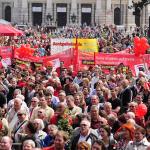What Should be Done for Workers' Rights During the Coronavirus Pandemic

Policy proposals from Left MEPs in the European Parliament.
1. Zero dismissals
All employees should be protected from dismissal. This includes preventing the non-renewal of fixed-term or temporary contracts and the status of false self-employed persons.
2. Leave no one behind
Measures must give priority to the protection of all workers, including those in atypical and precarious work such as domestic workers, migrant and platform workers, frontier and seasonal workers, the unemployed, self-employed, isolated workers and those suffering from in-work-poverty and homelessness. Water and electricity bills should be cancelled for all those in need during the crisis. All COVID19-related medical bills should be fully reimbursed. Parents caring for small children should be granted exceptional parental leave.
The European Union should accede to the revised European Social Charter and take immediate steps to guarantee the rights therein. All Member States should ratify the revised Charter. The European pillar of social rights should be fully implemented in order to combat poverty and social exclusion.
3. Maintain work and income – protective umbrella for workers
Temporary suspension of employment contracts must be met with financial resources to enable workers and citizens to afford living costs now and after the crisis.
In countries where short-time work is used, the level of short-time work compensation or social benefits must not push people to the edge of poverty.
While financial resources and subsidies protect employment and support companies in difficulty, redundancies and abuses must be prevented. Support measures should not be a guarantee for shareholder dividends.
Healthcare workers, carers, shop assistants, truck drivers, food delivery staff and postal delivery workers have proven to be “essential” for our societies during the pandemic. Working conditions, labour regulations and salaries should therefore be immediately increased.
This crisis makes clear women make up the majority of workers in critical infrastructure. It is therefore important that these professions are upgraded and that equal pay for work of equal value is finally enforced.
4. Strengthen collective agreements
Collective agreements between trade unions and employers’ organisations and tripartite agreements are, in accordance with the traditions of the Member States, an important instrument for agreeing on safeguards to protect wages, protection against dismissal and economic recovery. Collective bargaining is by far one of the best tools to ensure democratic and social rights of workers and to guarantee “no one is left behind”. The Commission and member states must actively promote and strengthen collective bargaining systems in all member states and at all levels, especially for workers in atypical and precarious employment and especially where systems have been damaged by troika policies.
The voice of the trade unions must be heard because they represent workers during and after this crisis. This includes collective bargaining and the right to industrial action. Collective bargaining without the pressure of collective action, such as strikes, is collective begging.
5. Health before profits
Considering the pandemic, the highest standards in working conditions, wages, work time and in particular health protection, especially the necessary protective measures against the coronavirus, must be ensured. This means, among others, that the wide availability of protective equipment must be ensured and social distance at work must be respected. If a lock-down is necessary it should include all non-essential productions. The same level of protection must be guaranteed for workers working at home. Workers should not be forced to work if there are risks to health and coronavirus infection. In several factories workers have taken the initiative to adapt and change production to the basic needs of people and society. This is the kind of industry we want. These practices should be encouraged.
6. Services are public
The civil service is our first line of defence. The workers in this sector should be protected, properly funded and infrastructure that has been privatised should return to public ownership. Health workers and other workers in critical infrastructure should be entitled to a monthly premium during the crisis. The public health service has been cut down by austerity measures and the Troika policies and has been privatised in many Member States. The European Union should recognise and respect public services and exclude them from market mechanisms. The importance of this sector and of scientific research has become obvious during this crisis. With public funding, public safeguards can be put in place to ensure that vaccines and treatments for coronary complaints become widely available free of charge.
7. A place to live for all
Housing must be ensured for all throughout the crisis and beyond. Evictions should be strictly prohibited. Borrowers should be allowed to suspend payments on housing loans for the duration of the crisis. Unoccupied hotels and other accommodation should be used to care for the homeless people and healthcare workers who need to be isolated. Accommodation in camps should be avoided.
8. Whatever it takes
“They counted pennies, we are counting deaths.” Austerity has put private profits before public healthcare. The Stability and Growth Pact should not be suspended, it should be abolished. We need a “whatever it takes” approach to public health and solidarity. The risk that economic recovery will be carried out on the backs of workers, the poor and public infrastructure should be prevented through measures that make the richest contribute like a corona wealth tax, a financial transaction tax and effective minimum corporate tax rates. Public investment will be crucial during the recovery period to support demand, including the subsequent social and green transition.
In 2008, the European Union saved the banks. Now is the time to save the people. The consequences of coronavirus should not be paid for by workers, taxpayers, the unemployed and people at risk of poverty or social exclusion but by large profitable companies, private banks and IT and platform giants that make use of public infrastructure and a well-trained workforce, but sustained partly by a growing number of poorly paid workers, false self-employed platforms and supply workers, while rejecting collective bargaining and avoiding taxes.
